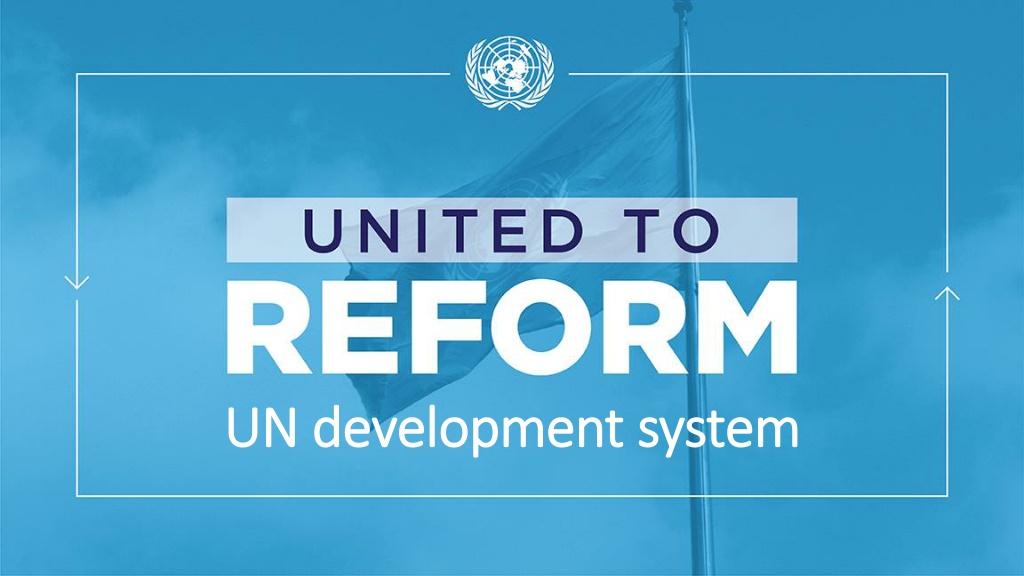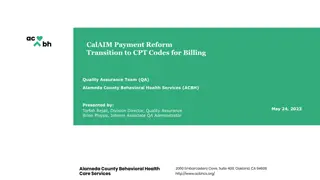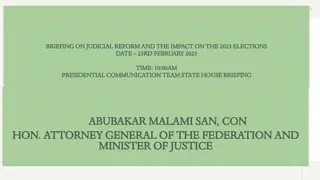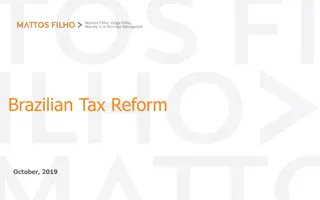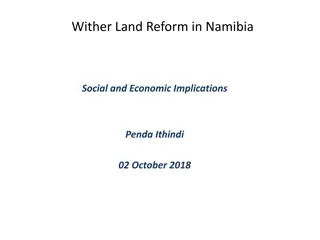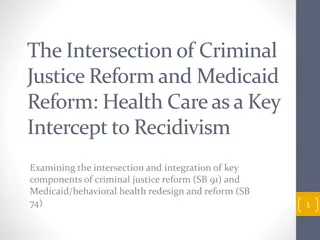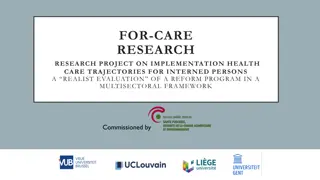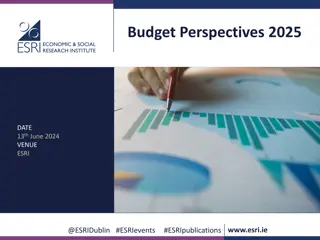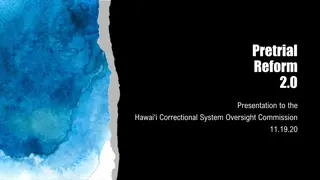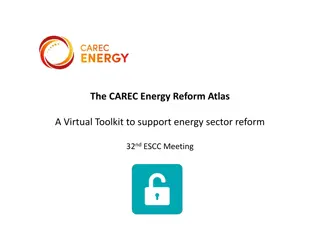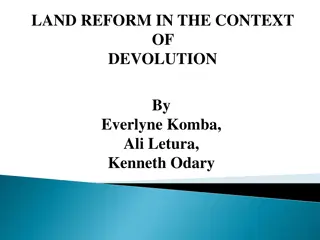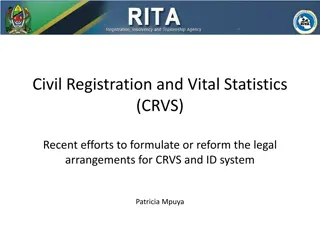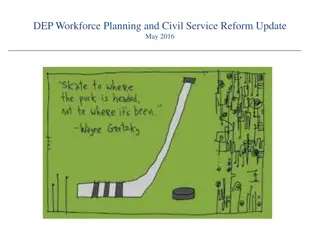Reform of the UN Development System and Its Impacts
The reform of the UN Development System (UNDS) brings significant changes to enhance its support for countries in achieving the Sustainable Development Goals (SDGs). It aims to make the UNDS more coherent, accountable, and effective, with a repositioned identity as a trusted partner for advancing the 2030 Agenda. Key changes include a stronger collective identity, better integration, and improved accountability to deliver on national needs. The reform also focuses on empowering Resident Coordinators and enhancing system-wide accountability at the country level.
Download Presentation

Please find below an Image/Link to download the presentation.
The content on the website is provided AS IS for your information and personal use only. It may not be sold, licensed, or shared on other websites without obtaining consent from the author. Download presentation by click this link. If you encounter any issues during the download, it is possible that the publisher has removed the file from their server.
E N D
Presentation Transcript
UN development system UN development system
What is the reform of the UN development system? What is the reform of the UN development system? brings far-reaching changes in the way the UNDS works to help countries around the world achieve the SDGs mandated by GA Resolution A/RES/72/279, of 31 May 2018 In response to the vision and proposals of United Nations Secretary-General Ant nio Guterres, to reposition the UNDS to deliver on the 2030 Agenda => Change in the way we deliver to the people we serve reform.un.org
What are the What are the main changes to main changes to expect from this expect from this reform? reform? More coherent, accountable and effective support to help countries achieve the 2030 Agenda reform.un.org
What are the main changes to expect from this reform? What are the main changes to expect from this reform? A repositioned UN development system with a stronger, better-defined collective identity as a trusted, reliable, accountable and effective partner to countries for achieving the 2030 Agenda; one that Member States invest in and rely on, because they understand and support what it does, what it can deliver on, and how it functions. The reform should yield a UNDS that is more integrated, delivers better on the ground, with clearer internal and external accountability for contributions to national needs, and with capacities, skillsets and resources better aligned to the 2030 Agenda. reform.un.org
What will the reform of the UNDS deliver? What will the reform of the UNDS deliver? A reinvigorated Resident Coordinator (RC) system with independent, empowered RCs at its centre 1 Jan 2019: new cohort of RCs as the highest-ranking development representatives of the UN system at country-level Leading 131 United Nations country teams (UNCTs), serving 164 countries and territories to deliver collective responses to national needs and ensure system-wide accountability on the ground RCs with strong leadership skills and sustainable development expertise Direct reporting line to the Secretary-General reform.un.org
What will the reform of the UNDS deliver? What will the reform of the UNDS deliver? Clear and more robust lines of accountability from UN country teams to host governments from the Resident Coordinator to the Secretary-General between Resident Coordinators and heads of UN entities at the country level A more coherent and better-coordinated utilization of global and regional capacities and resources focused on delivering support to countries together with UN country teams, through easily and reliably accessible analysis policy options technical expertise
What will the reform of the UNDS deliver? What will the reform of the UNDS deliver? A new generation of UN country teams (UNCTs) Composition, roles and profiles tailored to context Delivering shared results Through a redesigned UN Development Assistance Framework (UNDAF), as the main strategic planning and implementation instrument to respond to national needs and priorities. More adequate support infrastructure at global, regional and country levels to Support Resident Coordinators and UN country teams Improve functions and capacities of RCOs through UNDOCO at HQ and in regions reform.un.org
What will the reform of the UNDS deliver? What will the reform of the UNDS deliver? A shift in donor funding towards more predictable and flexible resources, to allow tailored support enhanced results delivery Streamlined operating practices through consolidation of back offices and service centers, for efficiency gains higher quality services More and better communication on what the UNDS does, how it operates what Member States get back. greater transparency, accountability and visibility for resources entrusted to the system reform.un.org
How is this reform different from previous UN reforms? How is this reform different from previous UN reforms? SDGs are the reference and the purpose of this reform Level of ambition is unprecedented, level of needs unprecedented 2030 Agenda represents a historic challenge and opportunity for multilateralism The most ambitious and comprehensive change process of the UN development system in decades reform.un.org
How is this reform different from previous UN reforms? How is this reform different from previous UN reforms? It benefits from strong leadership and unanimous support from Member States Unparalleled in scope Applies universally => Changing the UN development system is a shared responsibility reform.un.org
Why is the reform needed? Why now? Why is the reform needed? Why now? Member States need the UN development system to be fit for the purpose, the opportunities and challenges presented by the 2030 Agenda The current system has outstripped its capacity to be nimble and adequately responsive to the emerging challenges of the world Current global challenges, from climate change to growing inequality and entrenched poverty require global and integrated responses No single agency can respond alone The UN will operate as one that is greater than the sum of its parts, and demonstrate that multilateralism is the best option. reform.un.org
Whos doing what in the reform process? Who s doing what in the reform process? UN development system actors and Member States regular consultations at all levels Transition Team, inter-agency mechanisms, under leadership of Deputy Secretary-General, ensuring smooth process, well-sequenced roll-out with minimum disruption Working Group Transition Team Executive Office of the Secretary-General (EOSG) UN Development Programme (UNDP) UN Development Operations Coordination Office (UNDOCO) Department of Management (DM) Office of Legal Affairs (OLA) reform.un.org
What is the budget of the RC system? What is the budget of the RC system? Annual costs for reinvigorated Resident Coordinator system: USD281 million USD246 million in staffing and operating costs of RCOs and UNDOCO, of which over 85% to be invested in enhancing capacities and skillsets at country level 15% at regional and global level Dedicated fund for use by Resident Coordinators to support joint initiatives and activities with UN country teams and governments around coordination goals (USD35 million annually) reform.un.org
What are the benefits of the reform? What are the benefits of the reform? Higher quality, more integrated, and appropriately tailored operational support and policy advice for governments in efforts to meet SDGs A more collaborative and coherent UN development system where all relevant UN mandates, resources and competencies at global, regional and country level are brought together in support of the 2030 Agenda More effective and efficient operations, quantifiable in savings and costs, with improved service quality and timeliness More tailored, responsive UN presence in countries, anchored in national priorities, leading to economies of scale and enhanced collaboration amongst UN agencies, funds and programmes reform.un.org
What are the benefits of the reform? What are the benefits of the reform? Transparency and accountability in results and resources, for Member States and the public to better understand what the UN development system does, how and to what end Dedicated, independent and empowered coordination of development activities, with a new Resident Coordinator system able to leverage system-wide thinking and resources Improved funding practices by donors/Member States, with more predictable and flexible resources that incentivize integrated, tailored UN support to countries reform.un.org
What will success look like? What will success look like? Reform is not an end in itself Results on the ground matter Success is Improvement in quality, coherence and reliability of UN policy support to governments Ability to identify, design or support new partnerships Enhanced ownership by Member States and host governments of the UN development system and coordination Discipline of the UN to act and support countries as one Efficiency and effectiveness by which support is delivered reform.un.org
How will the reform process be tracked? How will the reform process be tracked? => Core element of the Secretary-General s vision: transparency All reform deliverables evaluated through dedicated mechanisms Global level: implementation of a reinvigorated Resident Coordinator system will be reported annually to the ECOSOC Operational Activities Segment. Field level: commitment to provide better access to results achieved are tracked including through online platforms and funding for activities Dedicated mechanisms to increase quality and credibility of UNDAF evaluations, better tailor and harmonize UN country level activities to meet urgent national priorities, and provide support regionally and globally reform.un.org
UN development system UN development system Thank you !
